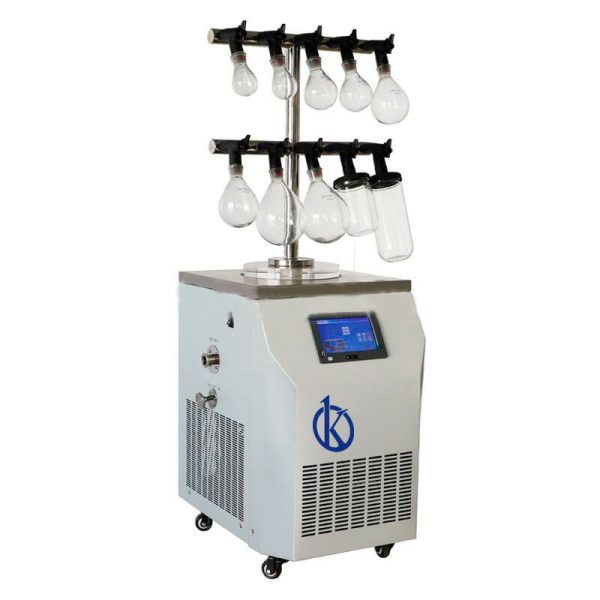Lyophilization, also known as freeze-drying, is a dehydration process used to preserve biological substances, foods, and medications. First, the liquid substance is rapidly frozen at very low temperatures, creating a solid structure of ice crystals. Subsequently, a high pressure is applied to directly sublime this solid structure into gas, skipping the liquid state; that is, the ice crystals evaporate directly into water vapor. Finally, the pressure is reduced and the temperature is elevated to eliminate any residual moisture. The result is a lyophilized powder, which retains the original properties of the liquid substance and can be easily reconstituted in water.
The lyophilizer has become an essential tool in medical science and lab research. The award for constant innovation in this area is annually obtained by the Kalstein model equipment, more specifically, the YR05186 and YR05193-1 models. Below, we break down each feature and specification that makes these laboratory freeze-drying equipment the best in their category.
Laboratory Lyophilizer Model YR05186
The Kalstein YR05186 laboratory lyophilizer is a reliable and efficient equipment designed to deliver high-quality results. This model offers a wide freeze-drying area of 0.12㎡ and an impressive condenser capacity of 3-4 L/24h, which allows the user to handle a variety of samples. https://kalstein.pl/product/benchtop-normal-lab-freeze-dryer-yr05186/
The condenser of this lyophilizer has a temperature of -55 ℃, with an option to reduce it to -80 ℃ for the most demanding freeze-drying needs. In addition, the equipment ensures a vacuum degree of less than 10 Pa, guaranteeing efficiency and precision in freeze-drying. Its material tray consists of 4 layers, allowing users to handle and process a large amount of material at once.
Customization and Capacity of the YR05186 Lyophilizer
The YR05186 comes with an 8-port collector and different flask options (1000 ml, 500 ml, 250 ml, 100 ml), offering users the flexibility to adjust the equipment according to their needs.
In terms of capacity, it can freeze-dry a mass volume of 1.2 l, with a thickness of 10 mm, and is capable of handling a large number of vials of different sizes (Φ12 mm: 920 pieces, Φ16mm: 480 pieces, Φ22mm: 260 pieces).
Laboratory Lyophilizer Model YR05193-1
On the other hand, the Kalstein model YR05193-1 vertical laboratory lyophilizer is another example of high-tech freeze-drying equipment, which adapts to the varying demands of today’s laboratory environment. It has a condenser capacity of 3 kg/24h and a temperature of -55℃, which can also be reduced to -80℃ if necessary. https://kalstein.pl/product/t-type-vertical-lab-freeze-dryer-yr05193-1/
It offers a vacuum degree of less than 10 Pa, ensuring maximum efficiency in freeze-drying. Moreover, this model is equipped with a sealed rubber valve with 24 pieces, designed exclusively for 24 ampoules, which gives users the possibility to customize its use depending on the type and quantity of sample they must process.
Energy Efficiency and Adaptability of the YR05193-1 Lyophilizer
In addition to its impressive technical features, the model YR05193-1 offers notable energy efficiency. Running at a voltage of 220V and 50Hz, it has a power of 750W, making it efficient in terms of energy consumption.
Its cooling system, which operates through air currents and must be kept at an ambient temperature of ≤25℃, along with its vacuum pump flow rate of 2L/S and 7.2 m3/h, ensure consistent and high-quality freeze-drying results. In conclusion, Kalstein’s laboratory lyophilizers offer reliability, efficiency, and flexibility, making them a valuable addition to any modern laboratory.

